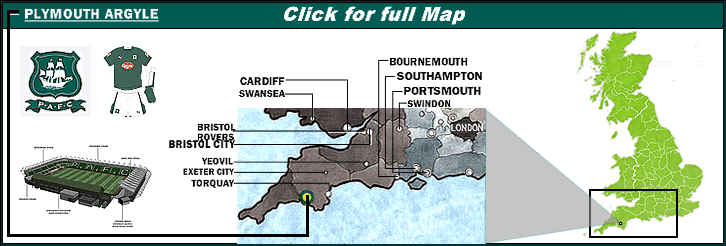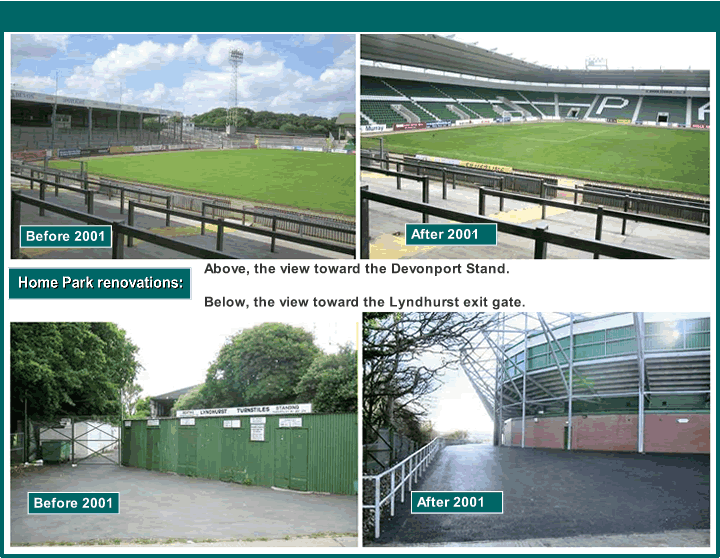
Argyle Football Club was formed in Plymouth, Devon, in 1886, but went out of existence in 1894. The club was reformed 3 years later, in 1897, and merged with the nearby Argyle Athletic Club (a general sporting club) in 1898. Plymouth Argyle chose to wear dark green, with black trim, the colors of the Borough of Plymouth.
In 1900, the club won it’s first trophy, winning the Devon Senior League; and the club purchased it’s lease on Home Park, their ground to this day. The club became fully professional in 1903, joining the Southern League, and changing it’s name to Plymouth Argyle FC. Their first pro match was on September 1, 1903, versus West Ham United.
Plymouth Argyle was invited to join the English Football League in 1920, when the League expanded to three levels. PAFC became a founding member of the Football League Third Division. Argyle just missed promotion for six straight seasons (1922 through 1927). The club finally reached the Second Division in 1930, by winning the Third Division (South) in 1929-30. Their stay in the second tier lasted 20 seasons, from 1930 to 1950. Plymouth won promotion back to the 2nd Level two years later (1952), but this spell there lasted just 4 seasons (until 1956).
Overall, Plymouth Argyle have had 8 promotions, and 7 relegations, spending 37 seasons in the 2nd Level, 38 seasons in the 3rd Level, and 5 seasons in the 4th Level. Their highest finish was at 4th place, in the Second Division, which they acheived twice, in 1932, and in 1953. Plymouth’s best FA Cup run was in 1984, when they made it all the way to the Semi-Finals, losing to Watford.
The club’s lowest placement occurred rather recently, in 1999, when they finished 13th place, in the old Division Three (which is the 4th Level). Attendance was poor too, with the club only drawing 5,5oo for two seasons (1997-’99).

Home Park was was almost entirely refurbished between 2001 and 2002, and the three new stands have (along with good recent form) helped swell gates to the 13,000-level (admittedly low, for the 2nd Level, and a city of Plymouth’s size of around 250,000). The new Devonport Stand now dominates the ground, and the stand structure runs along 3 sides. The Mayflower Stand remains from the past configuration, and the terraced part of the stand is kept empty for safety, while the club is unable to refurbish this remaining area (for lack of funds).
To see more photos of Home Park’s renovation, click here: (http://www.greensonscreen.co.uk/stadiumhome.asp)
Paul Sturrock {see here} was appointed manager in November, 2000, when Argyle were fourth from bottom, in the 4th Level, two spots away from relegation out of the League. The Scotsman led the club to a 12th place finish that season, and to promotion the following season (2001-’02), by winning Division Three. Two years later, in March, 2004, Sturrock had Plymouth en route to their second promotion in 3 years, when he was enticed to take the managerial reins of the Premier League club Southampton. A few weeks later, under new manager Bobby Williamson, Plymouth Argyle won promotion to League One (the 2nd Level, now called the League Championship).
Williamson’s tenure lasted 18 months. He was sacked after the club began the 2005-’06 season with 6 straight defeats. His successor, (current league-leading) Stoke City manager Tony Pulis, also did not mesh with squad, fans and the board. Pulis left at the end of the ’06 season. West-country born Ian Holloway took over, and Argyle had a good season , and a good FA Cup run, in 2006-’07. PAFC made it to the Quarter-Finals of the FA Cup, and finished in 11th place in the 2nd Level, their best finish in two decades. Actually, in spite of the high manger-turnover (4 different managers in 3 years), Plymouth Argyle have improved their League standing every year for the last 6 seasons.
However, manager instability continues to plague Argyle, as Ian Holloway left Plymouth for Leicester City, in November, 2007. In stepped the prodigal son, Paul Sturrock, to return to the club he raised out of the fourth and third tiers. From Holloway, Sturrock has inherited a scrappy side that features no real standout. In fact, Plymouth just sold their leading scorer, Sylvain Ebanks-Blake, to Wolves, in January, for 1.5 million pounds. Their current leading scorer is Hungarian international Peter Halmosi {see this}, with 7 league goals (8 overall). The squad is captained by Frenchman Lillian Nalis.
Last Saturday, Argyle beat Burnley 3-1, to vault into the playoff places, at 5th place.**{See this short feature about Peter Halmosi making the Team of the Week.)
Plymouth Argyle has never been in the first division. It is the furthest west and south club in the Football League. PAFC, Exeter City, and Torquay United are the only sizable clubs in Devon, further west is Cornwall, which has no clubs in the League (the highest 4 leagues), or the Conference (the 5th level). The club, like Carlisle (up in the far northwest of England), suffers for it’s geographical remoteness. Travel to fixtures is significantly further than other clubs, plus it is hard to attract players to this remote footballing outpost.
** Click here, for a pretty nice article I stumbled upon, about the peculiar aspects of PAFC.
**Click here, for an article about the January, 1932 4th Round FA Cup match in London, versus Arsenal.
Thanks to (historical kits[dot]co[dot]uk): the 5 older kits on the bottom, right-hand side of the chart are copyright Historical Football Kits, and are reproduced by permission. Thanks to (colours-of-football[do]com) for the newer kits. Thanks to (footballgroundguide[dot]co[dot]uk); (stadiumguide[dot]co[dot]uk). Thanks to Greens On Screen website, for the great photos of the Home Park renovation.

